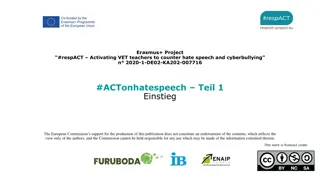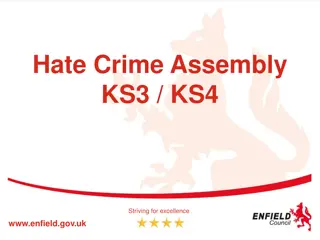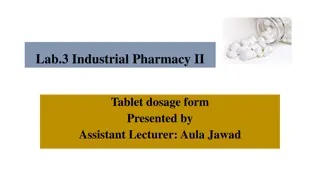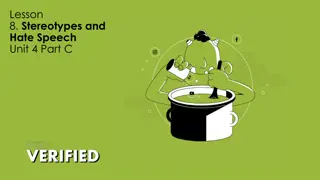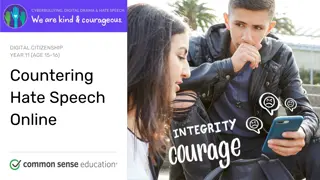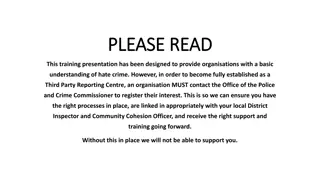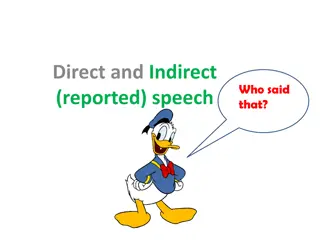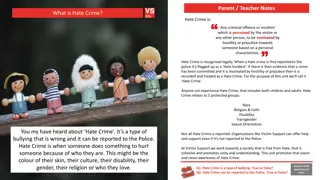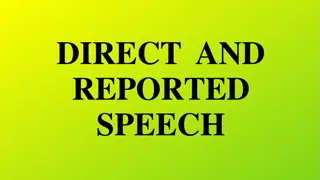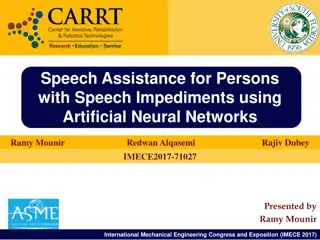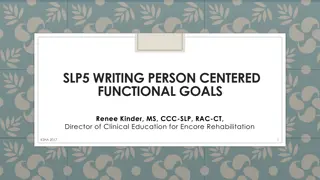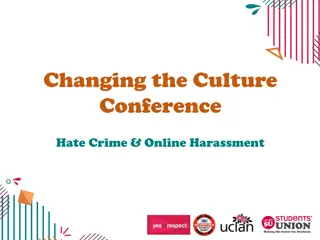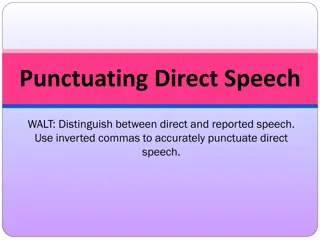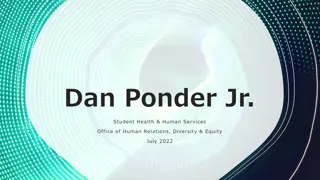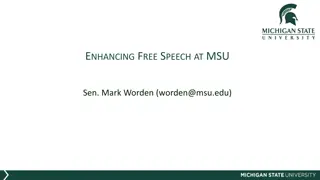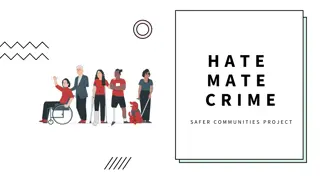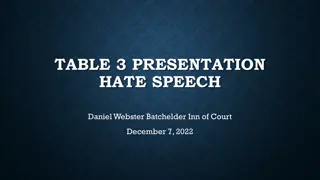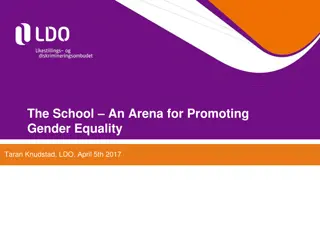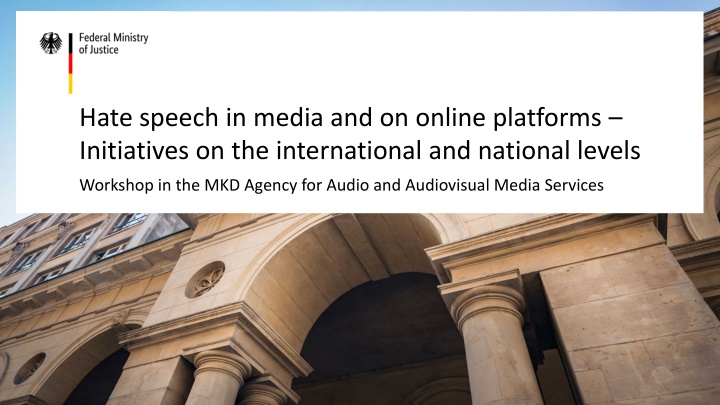
Hate Speech: International and National Initiatives
Explore the definition and impacts of hate speech, as well as initiatives on international and national levels to combat this harmful phenomenon. Learn about UN, CoE, and EU initiatives, and the importance of addressing hate speech to promote inclusivity and democracy.
Download Presentation

Please find below an Image/Link to download the presentation.
The content on the website is provided AS IS for your information and personal use only. It may not be sold, licensed, or shared on other websites without obtaining consent from the author. If you encounter any issues during the download, it is possible that the publisher has removed the file from their server.
You are allowed to download the files provided on this website for personal or commercial use, subject to the condition that they are used lawfully. All files are the property of their respective owners.
The content on the website is provided AS IS for your information and personal use only. It may not be sold, licensed, or shared on other websites without obtaining consent from the author.
E N D
Presentation Transcript
Hate speech in media and on online platforms Initiatives on the international and national levels Workshop in the MKD Agency for Audio and Audiovisual Media Services
About hate speech UN initiatives CoE initiatives EU initiatives National initiatives
What is hate speech? No authoritative, legally binding definition at the international or European levels Generally understood as all types of expression that incite, promote, spread or justify violence, hatred or discrimination against a person or group of persons, or that denigrates them by reason of their real or attributed personal characteristics or status such as race , colour, language, religion, nationality, national or ethnic origin, age, disability, sex, gender identity or sexual orientation
What impacts has hate speech? Individual directly targeted Personal harm Silencing effect Persons belonging to the same group or minority Divisions in society Democracy Danger to participation and inclusion
UN initiatives against hate speech International Convention on the Elimination of All Forms of Racial Discrimination (ICERD; 1965), Art. 4 International Covenant on Civil and Political Rights (ICCPR; 1966), Art. 20 2 Rabat Plan of Action (expert workshops on the prohibition of incitement to national, racial or religious hatred by UN Office of the High Commissioner for Human Rights; 2011-2012) UN Strategy and Plan of Action on Hate Speech (UN Secretary-General; 2019) Enhance UN efforts to address root causes and drivers of hate speech Enable effective UN responses to the impact of hate speech on societies
CoE initiatives against hate speech Convention for the Protection of Human Rights and Fundamental Freedoms Right to respect for private and family life, Art. 8 Prohibition of discrimination, Art. 14 Freedom of expression, Art. 10 European Commission against Racism and Intolerance (ECRI) General Policy Recommendation No. 15 on Combating Hate Speech (2015)
CoE initiatives against hate speech Case law of the European Court of Human Rights (ECHR) Prohibition of abuse of rights, Art. 17 Restrictions of Art. 10 2 (triple test) Provided for by law Pursue legitimate purposes Strictly necessary and proportionate in a democratic society
CoE initiatives against hate speech Recommendations of the Committee of Ministers Rec(97)20 on hate speech Rec(97)21 on the media and the promotion of a culture of tolerance Rec(2014)6 on a Guide to human rights for Internet users Rec(2018)2 on the roles and responsibilities of Internet intermediaries Rec(2022)16 on combating hate speech
CoE recommendation on combating hate speech Procedure Committee of Experts, September 2020 October 2021 Steering Committee on Anti-Discrimination, Diversity and Inclusion (CDADI) + Steering Committee on Media and Information Society (CDMSI) Committee of Ministers, 20 May 2022 Deliverables Recommendation Explanatory Memorandum
CoE recommendation on combating hate speech Comprehensive approach to combating hate speech Properly calibrated measures adapted to the severity of hateful expressions Hate speech that is prohibited under criminal law Hate speech that is subject to civil or administrative law Offensive or harmful types of expressions which call for alternative responses (awareness-raising, education, training and use of counter-speech and alternative speech)
CoE recommendation on combating hate speech Legislation regarding online hate speech Legislative framework should take into account different characteristics of Internet intermediaries and media operating online substantial differences in size, nature, function and organisational structure ECHR Delfi AS v. Estonia: professionally managed Internet news portal run on a commercial basis, one of the biggest online publications in the country, known public concern regarding the controversial nature of comments it attracted
CoE recommendation on combating hate speech Legislation regarding online hate speech Duties and responsibilities of Internet intermediaries Rapid processing of reports on hate speech Removing hate speech without delay Giving reasons for their decision to individuals and institutions concerned Securing evidence relating to hate speech prohibited under criminal law Reporting cases of such criminal hate speech to the authorities Referring unclear and complex cases to self-regulatory or co-regulatory institutions Provisional measures such as deprioritisation or contextualisation
CoE recommendation on combating hate speech Legislation regarding online hate speech Legal duties for media operating online Not disseminating hate speech prohibited by law Restriction or disabling of access to hate speech posted by third parties in comments sections or collaborative spaces
CoE recommendation on combating hate speech Legislation regarding online hate speech Rules and procedures for effective co-operation between State and non-State actors System for the disclosure of subscriber information Reports on hate speech Member States Internet intermediaries Regular assessment and improvement of content moderation systems
CoE recommendation on combating hate speech Recommendations addressed to Internet intermediaries Identify expressions of hate speech and act upon them Elaborate and apply alternatives to the removal of content in less severe cases of hate speech Use of automation and AI is overseen by human moderation Appoint a sufficient number of content moderators Co-operate with civil society organisations Advertising systems do not incentivise the dissemination of hate speech Develop internal processes that detect and prevent risks to human rights
CoE recommendation on combating hate speech Recommendations addressed to media Fulfil public watchdog role and contribute to public debate Promote a culture of tolerance and understanding Avoid negative stereotypical depiction of individuals, groups and communities Give voice to diverse groups and communities Public service media should make a particular substantial contribution Independent national regulatory authorities and media co-regulatory or self-regulatory bodies should play a positive role in addressing hate speech
EU initiatives against hate speech Framework Decision 2008/913/JHA on combating certain forms and expressions of racism and xenophobia by means of criminal law Code of conduct on countering illegal hate speech online Agreed by EU Commission in May 2016 with 4 IT companies 8 more IT companies joined the code of conduct Commitments Have in place clear and effective processes to review notifications Review the majority of valid notifications in less than 24 hours and remove or disable access to illegal hate speech Improve feedback to users and be more transparent towards general society
EU initiatives against hate speech Directive (EU) 2018/1808 amending the Audiovisual Media Services Directive 2010/13/EU (AVMSD) Provisions applicable to video-sharing platform services, Art. 28b AVMSD Protection of minors Protection against incitement to violence or hatred Protection against content that constitutes a criminal offense under Union law (terrorist content, child pornography, racism and xenophobia) Notice and take-down mechanism Digital Services Act Next presentation by Claire Moselage
National initiatives against hate speech Germany Network Enforcement Act (NetzDG) Notice and take-down mechanism (manifestly illegal: 24 hours/other: 7 days) Review of decisions Transparency reports (each half-year) Contact person within Germany Administrative fines (up to 50 Mio. EUR)
National initiatives against hate speech Austria Kommunikationsplattformen-Gesetz France Loi Avia Loi confortant le respect des principes de la R publique CJEU (9 November 2023, C-376/22 KommAustria) Measures of a general and abstract nature can only be taken by the country of establishment (e-commerce directive)
Thank you for your attention! Federal Ministry of Justice Division III B 7 Telecommunications and Media Law; Protection against Digital Violence; ePrivacy Mohrenstr. 37 10117 Berlin Germany Contact person: Dr. Alexander Sch fer Head of Division schaefer-al@bmj.bund.de Tel. +49 30 18 580-9327 www.bmj.de

![Prevention and Combating of Hate Crimes and Hate Speech Bill [B.9B.2018]](/thumb/60513/prevention-and-combating-of-hate-crimes-and-hate-speech-bill-b-9b-2018.jpg)
